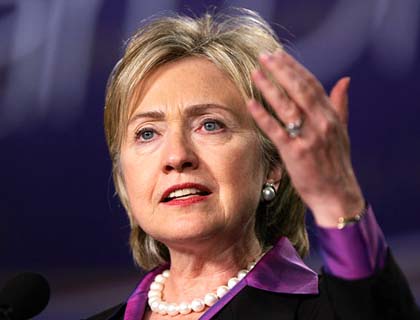WASHINGTON - As much as 90 percent of the text of Strategic Partnership between the US and Afghanistan has been agreed upon, the Secretary of State, Hillary Clinton, told lawmakers on Thursday.
Testifying before a Congressional committee, Clinton said so far the US had three rounds of discussions with the Government of Afghanistan in that regard.
"These discussions resulted in a text that is about 90 percent agreed to, including strong commitments on economic/social development, democratic institution-building, human rights, anti-corruption, and other important long-term reforms," Clinton said.
Clinton, among other things, envisioned establishing an Afghanistan-United States bilateral commission and associated implementation mechanisms to help them focus remain on what needs to be done during the transition process.
The US Ambassador to Afghanistan and America's top general in the country, were still working through some of the security cooperation issues with President Hamid Karzai, she said.
"The negotiation is under process, but I want to assure the Congress that although we do not expect this to take the form of a treaty or to require advice and consent of the Senate, we will consult with you on where we are in this process," Clinton said.
In her remarks, Congresswoman, Ileana Ros-Lehtinen, Chairperson of the House Committee on Foreign Affairs, said progress in the fight was undeniable, but gains remained fragile.
On the one hand, the US is negotiating with the Haqqani network, and yet on the other, it is attempting to destroy the Haqqani network. "There have been some unwelcome developments since the President's announcement four months ago such as the multiple, high profile assassination of major leaders in Afghanistan," she said.
Turnover to the Afghan national security forces remained a significant challenge in some of the key contested areas, she noted and said she was troubled by Iran's threatening and unhelpful role in Afghanistan.
"So I ask what additional pressure we are bringing to bear to offset the Iranian influence in Afghanistan. The most important long-term aspect of the American relationship with Afghanistan today is the strategic partnership declaration under negotiation with Kabul," she said.
"During the negotiations over the strategic framework agreement and the status of forces agreement with Iraq, the previous administration extensively engaged and consulted the Congress in a bipartisan manner. We are disappointed that a similar level of outreach, engagement, consultation, transparency on this critical issue has been decidedly absent on the current Afghanistan negotiations," the Congresswoman said.

